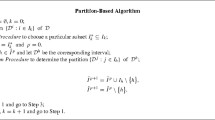Abstract
In this paper, we present a derivative-free algorithm based on modified minimal positive base for bound constrained optimization problems. Compared with the derivative-free algorithms based on the maximal 2n positive base, the algorithms based on the minimal \(n+1\) positive base only need at most \(n+1\) function evaluations at every iteration, where n is the number of variables. Therefore, we can reduce the number of function evaluations from 2n to \(n+1\) at each iteration. But the minimal positive base can cause undesirable large angles between some positive base directions and large unexplored feasible domain. In order to overcome this defect, we propose a modified set of feasible directions based on the minimal positive base and the technique of search direction rotation to investigate the unexplored domain at the next iteration. Accordingly, convergence to stationary points is proved. Moreover, the numerical experiments show that the method based on modified minimal positive base can reduce the number of function evaluations and is beneficial in a derivative-free context.


Similar content being viewed by others
Explore related subjects
Discover the latest articles, news and stories from top researchers in related subjects.References
Torczon V (1997) On the convergence of pattern search algorithms. SIAM J Optim 7(1):1–25
Fermi E, Metropolis N (1952) Numerical solution of a minimum problem. Los Alamos Unclassified Report LA-1492, Los Alamos National Laboratory, Los Alamos
Box G (1957) Evolutionary operation: a method for increasing industrial productivity. Appl Stat 6(2):81–101
Hooke R, Jeeves T (1961) Direct search solution of numerical and statistical problems. J Assoc Comput Mach 8(2):212–229
Dennis J, Torczon V (1991) Direct search methods on parallel machines. SIAM J Optim 1(4):448–474
Lewis R, Torczon V (1999) Pattern search algorithms for bound constrained minimization. SIAM J Optim 9(4):1082–1099
Lewis R, Torczon V (2000) Pattern search methods for linearly constrained minimization. SIAM J Optim 10(3):917–941
Lewis R, Torczon V (1996) Rank ordering and positive bases in pattern search algorithms. Technical Report 96-71, Institute for Computer Applications in Science and Engineering, NASA Langley Research Center, USA
Lucidi S, Sciandrone M (2002) A derivative-free algorithm for bound constrained optimization. Comput Optim Appl 21:119–142
Liuzzi G, Lucidi S, Sciandrone M (2006) A derivative-free algorithm for linearly constrained finite minimax problems. SIAM J Optim 16(4):1054–1075
Liuzzi G, Lucidi S, Sciandrone M (2010) Sequential penalty derivative-free methods for nonlinear constrained optimization. SIAM J Optim 20(5):2614–2635
Liuzzi G, Lucidi S, Rinaldi F (2012) Derivative-free methods for bound constrained mixed-integer optimization. Comput Optim Appl 53(2):505–526
Liuzzi G, Lucidi S, Rinaldi F (2014) Derivative-free methods for mixed-integer constrained optimization problems. J Optim Theory Appl 164(3):933–965
Vicente L (2013) Worst case complexity of direct search. EURO J Comput Optim 1(1):143–153
Dodangeh M, Vicente L, Zhang Z (2016) On the optimal order of worst case complexity of direct search. Optim Lett 10(4):699–708
Cocchi G, Liuzzi G, Papini A et al (2018) An implicit filtering algorithm for derivative-free multiobjective optimization with box constraints. Comput Optim Appl 69(2):267–296
Latorre V, Habal H, Graeb H et al (2018) Derivative free methodologies for circuit worst case analysis. Optim Lett. https://doi.org/10.1007/s11590-018-1364-5
Audet C, Dennis J (2006) Mesh adaptive direct search algorithms for constrained optimization. SIAM J Optim 17(1):188–217
Abramson MA, Audet C, Dennis JE Jr (2009) OrthoMADS: a deterministic MADS instance with orthogonal directions. SIAM J Optim 20(2):948–966
Ianni A, Audet C, Digabel SL, Tribes C (2014) Reducing the number of function evaluations in mesh adaptive direct search algorithms. SIAM J Optim 24(2):621–642
Liuzzi G, Risi A (2012) A decomposition algorithm for unconstrained optimization problems with partial derivative information. Optim Lett 6(3):437–450
Grippo L, Rinaldi F (2015) A class of derivative-free nonmonotone optimization algorithms employing coordinate rotations and gradient approximations. Computational Optim Appl 60(1):1–33
Cust A (2006) Using simplex gradients of nonsmooth functions in direct search methods. IMA J Numer Anal 28(28):770–784 (15)
Le Digabel S (2011) Algorithm 909: NOMAD: nonlinear optimization with the MADS algorithm. ACM Trans Math Softw 37(4):1C15
Elster C, Neumaier A (1995) A grid algorithm for bound-constrained optimization of noisy functions. IMA J Numer Anal 15:585–608
Hock W, Schittkowski K (1980) Test examples for nonlinear programming codes. J Optim Theory Appl 30(1):127–129
Schittkowski K (1987) More test examples for nonlinear programming codes. Lecture notes in economics and mathematical systems, vol 282. Springer, Berlin
Hedar A (2013) Test functions for unconstrained global optimization. http://www-optima.amp.i.kyoto-u.ac.jp/member/student/hedar/Hedar_?les/TestGO_?les/Page364.htm. Accessed 15 Feb 2013
More J, Wild A (2009) Benchmarking derivative-free optimization algorithms. SIAM J Optim 20:172–191
Acknowledgements
This study of Hongwei Liu was supported by the Natural Science Basic Research Plan in Shaanxi Province of China (Program No. 2017 JM1014) and the study of Shanxue Yang was funded by Yanta Scholars Foundation of Xi’an University of Finance and Economics.
Author information
Authors and Affiliations
Corresponding author
Additional information
Publisher's Note
Springer Nature remains neutral with regard to jurisdictional claims in published maps and institutional affiliations.
Rights and permissions
About this article
Cite this article
Yang, S., Yang, Z., Fu, Y. et al. Reducing the number of function evaluations in derivative-free algorithm for bound constrained optimization. Evol. Intel. 16, 1779–1788 (2023). https://doi.org/10.1007/s12065-019-00324-4
Received:
Revised:
Accepted:
Published:
Issue Date:
DOI: https://doi.org/10.1007/s12065-019-00324-4




